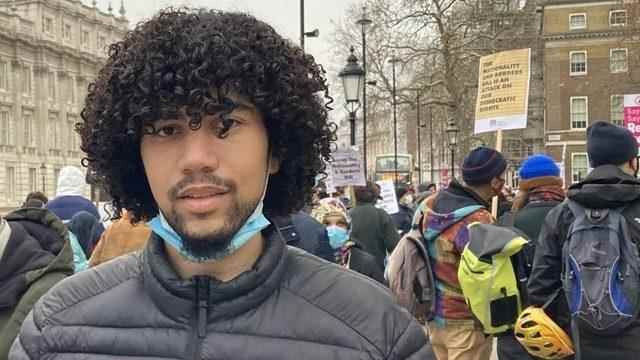“Terrorists, war criminals, spies”… The government says the new bill regulating citizenship and immigration will target them as well.
If the new Nationality and Boundaries debated in the House of Lords is approved, the government will be able to do so without notifying it when it decides to strip a person of citizenship.
Home Secretary Priti Patel says the new regulation will only be applied in “very unusual circumstances” against people who pose a grave danger to the UK.
But the bill is being protested by many demonstrations. Concern has been expressed that nationals from ethnic and immigrant communities will be treated differently from white British citizens, even if they are accused of the same thing.
The government told the BBC’s Newsbeat program that the “atmosphere of fear” over the bill was based entirely on false ideas and inconsistent with the facts.
How is citizenship lost?
Citizenship, above all, means having the right to live in a country. Non-citizens cannot vote and have difficulty finding jobs, access to education and health services.
But naturalization is not a new concept. UK governments have actually had the power to strip them of citizenship for over a hundred years, and it’s up to each individual’s decision to be made personally by the interior ministers.
In recent years, this issue has come to the fore more frequently in connection with Islamist terrorism.
A well-known example is British-born Shamima Begum.
Begum, who went to Syria via Turkey with her two girlfriends of the same age in 2015 when she was 15, joined ISIS, was stripped of her citizenship in 2019 on security grounds.
Different treatment of immigrants and children of immigrants
According to international law, especially the Universal Declaration of Human Rights of 1948, everyone has the right to be a citizen of a country and therefore no one can be arbitrarily left without a state.
But the UK government says that if a person is also a citizen of another country, i.e. has dual citizenship, or is entitled to be a citizen of another country, for example the country of their parents, then that person can be stripped of their British citizenship.
Other situations, aside from national security, that necessitate expulsion without warning, include more ambiguous justifications such as continued relations with other countries and “public interest”.
What do critics of the bill say?
The different part of the law, which is different from the old one, relieves the government of the obligation to inform the person it has decided to strip.
But minority communities in the country say they could become “second-class citizens” if the law is passed.
Among those voicing this view and demonstrating outside the Prime Minister’s Office in December and January are more than 20 minority community organisations, including the British Muslim League, the UK Sikh Council and Wisdrush Lives (Caribbean immigrants).
They point out that what was done to Shamima Begum, namely the removal of citizenship, cannot be applied to a white British citizen as there is no possibility of her being a citizen of another country, and therefore citizens are divided against the law.
Fatima, who did not want her surname to be used during one of the demonstrations held in December, says the measures went too far and created an “environment of fear” for British Muslims like herself.
“I pay my taxes, I love this country. But this government makes me feel like I don’t belong here, it forces me to question my identity,” Fatima says.
Fatima also says that the concepts such as “public interest” used in the law are also vague, and if desired, even demonstrating against the government or on environmental issues can be included in this scope.
“The government determines that whatever is done will violate the law, so they can expand this coverage by adding whatever they want,” he says.
Attorney Samir Pasha is an immigration law expert. He says the new law expands the government’s powers and creates a gray area for the government to act as it wishes. “Public interest is a very general concept, and it allows the government to fill in on it when it comes to stripping someone of their citizenship,” he says.

Student Leo Power is also one of the participants in the demonstrations in front of the Prime Ministry. He also points out that the proposed new regulation will make the objection much more difficult if the government makes a mistake.
“The government says it will not strip lawful citizens of their citizenship. But how did the Windrush thing happen? Did these people commit a crime? Did they break the law?” he asks.
The Windrush scandal takes its name from the ship that carried people who immigrated to Britain from the Caribbean in the 1950s for labor needs.
Many people, mostly from Caribbean islands, who have lived and worked in Britain for decades, have been deported in recent years as illegal immigrants, and the government apologized when the details of the scandal emerged.
Some of those injured in this incident are still waiting for the government to pay compensation.
Student Leo also says he’s half Dominican. “Some of my aunts here were born there and live in fear of Windrush.”
What does the government say?
Tom Pursglove, the Home Office’s deputy secretary for immigration, says the proposed arrangement is “proportionate to need and reasonable” that does not broaden the scope of those affected at the individual level.
“Every year there are very, very small numbers of very harmful individuals who want to harm the people of this country,” he said.
Deputy Minister Pursglove did not answer the BBC’s question as to what the “public interest” rationale used in the regulation meant, but reiterated that the law is the right approach to protect the country’s people.
The BBC also asked the deputy minister about the concerns raised by the Windrush incident.
Pursglove replied, “I don’t think you can draw parallels with Windrush. But the main point is that people can object and try to change the decision in the normal way.”
What will happen now?
The bill was approved by the House of Commons of the British Parliament in December.
It is now on the agenda of the House of Lords. Following the discussion here, it will go to the mixed commission on January 27, where deputies will be able to propose changes.
